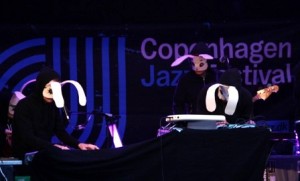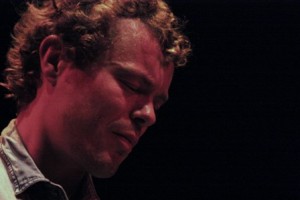COPENHAGEN JAZZ FESTIVAL
Gretchen Parlato, Jakob Bro, Sleep Party People
Copenhagen, Denmark
July 8-10
Review by Seth Rogovoy
(COPENHAGEN) – The final three concerts I saw at the Copenhagen Jazz Festival on Friday and Saturday partly serve as a model for the eclectic nature of the festival – ranging from Sleep Party People’s electronica-laced indie-rock to the Jakob Bro Trio’s lyrical improvisations to Gretchen Parlato’s latter-day jazz-pop vocals. Tying it all together was a high level of creativity and virtuosity, demonstrating that the programming of the festival strives for both and succeeds.
Sleep Party People are a hoot. The sextet all wear black jeans and black hoodies pulled up over their heads, over which they wear silly white bunny masks with floppy white bunny ears. It’s a simple but brilliant trick – everyone in the band winds up looking exactly the same, playing with the element of beauty (that, for example, the band Our Broken Garden, which played on the same stage the night before, boasted in spades, as well as musicality); it erased gender distinctions, as you couldn’t tell the men from the women (by my estimation, being in close proximity to the stage with a telephoto camera lens and able to see almost underneath the masks, the ratio is 5 to 1), an effect only emphasized by the processing of the lead singer’s voice (more on that in a minute); and simply adding a childlike playfulness to music that is already childlike and playful. The group, in this case, is aptly named.
Performing in the beautiful 19th-century-like Charlottenborg outdoor courtyard in the “something else” series, Sleep Party People were anything if sleepy, however. If you didn’t know that the lead vocalist was a man, but just heard his voice, you might think he was a three-year-old boy (or girl) singing dreamy gibberish, or taking over as lead singer of the Cocteau Twins, perhaps, to whom the group presumably pays musical and vocal homage. The group’s songs boasted infectious waves of moody, melancholic melody – sort of like a laptop . version of the National. It’s only proper that one of the band’s signature songs is “I’m Not Human at All,” as that is precisely the effect the group is after, but not in an icy, dehumanized New Wave manner, but rather, through the very clever trick of disguising a very humanistic approach behind literal and musical masks.
Guitarist-composer Jakob Bro had Brooklyn-based saxophonist Bill McHenry join his trio for his performance on Saturday night at the Skuespilhuset, a gorgeous new state-of-the-art concert hall on the harbor. It’s frankly hard to imagine the Jakob Bro Trio without McHenry, so perfectly does his aesthetic mesh with Bro’s. Not knowing how the two met, musically or otherwise, one just has to marvel at how sympatico they were.
McHenry’s remarkably subdued, lyrical approach complemented Bro’s delicate, Bill Frisell-like latticework. The two often played in tight unison – again, as if they had been playing together for years, with one occasionally veering off into harmony, but never far from the other. If theirs was a minimalist aesthetic in terms of dynamics, it lost nothing in terms of tension and release – they merely got quieter and left more space where others might play faster and louder and more notes. Both approaches actually create the same end result, and Bro and McHenry, backed by Anders Christensen on bass and Jakob Hoyer on drums, were at ease with bluesy swing, Latin rhythms, Calypso, and even surf-rock.
Gretchen Parlato made a good pairing with Bro and company, as she likewise is an anti-belter. Partly this is an approach that is imposed by nature – if there’s anything to be criticized about her voice, it’s that she lacks range and color. But kudos to Parlato for accepting those limitations, merely wiping off the slate, and using every other tool at her disposal in order to develop a complete and affecting, ethereal vocal approach that frankly says as much or more with rhythm, phrasing, breath, and tone that does many a singer attempts with just a big fat voice that she doesn’t know what to do with.
Parlato isn’t the first female vocalist to get across with a limited instrument – Billie Holiday and Astrud Gilberto weren’t exactly Celine Dion, either – and Parlato’s technique – which garnered her the 2004 Thelonious Monk Institute International Vocal Competition award — got its greatest workout on her most ambitious numbers, which included Herbie Hancock’s “Butterfly” and Thelonious Monk’s “Ugly Beauty” in addition to more conventional original pop-jazz material (and even a cover of pop band Simply Red’s “Holding Back the Years”) that owed as much to Stevie Wonder as anyone.
Backed by the phenomenal, Grammy Award-nominee Taylor Eigsti on piano, along with Alan Hampton on bass and Mark Guiliana replacing her usual drummer, Kendrick Scott (who was performing at that very moment with Terence Blanchard in Copenhagen), Parlato was that rare bird these days – an authentic jazz singer, one who knows how to play voice and breath the way one plays a musical instrument. It’s the difference between being a singer and being a jazz musician whose voice is her instrument, which is how and why Parlato gets across. She knew how to use her tone and breath, moving it around from her diaphragm to her throat to her mouth even to her nasal cavity for a reedlike effect. She was also deft with pitch and modulations, and never hit a wrong note. She was also utterly organic, not trying to sound like anyone other than herself.
The greatest display of her musicality was Parlato’s unique arrangement of Paulinho da Viola’s “Cancion Del Abuelo,” which began life as a samba but which Parlato turned into a journey from Ghana to Brazil, replete with African vocal techniques and percussion (played by Parlato herself – no easy task to sing and play at the same time). Parlato sang the piece essentially a cappella, with her bandmates laying off except to use their hands on their instruments, including Eigsti on the piano. It was a terrific demonstration of all her skill and talent, in what for this first-time visitor capped off an exciting visit to one of Europe’s foremost jazz festivals, and one with a much-deserved sterling reputation.
Seth Rogovoy is an award-winning music critic and the author of Bob Dylan: Prophet Mystic Poet and The Essential Klezmer: A Music Lover’s Guide to Jewish Roots and Soul Music.



